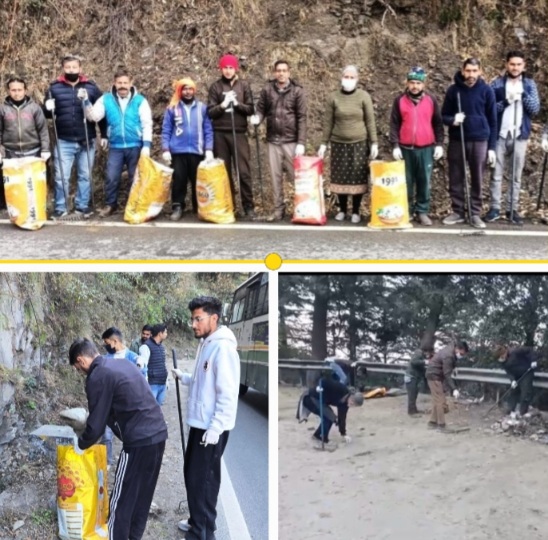Will other SDMs Follow Shimla Rural? Over 700 Bagful of Wastes Collected and Disposed of.
SHIMLA: The Shimla Rural administration's ‘Har Roz Swachhta Ka Doz’ campaign is fast emerging as a game changer, setting an example for other SDMs across Himachal Pradesh.
Spearheaded SDM Shimla Rural Kavita Thakur, this initiative aims to keep the gateway of Shimla clean and green.
With active participation from staff members of Tara Devi and Sanjay Mochan temples and local residents, the drive has transformed into a people’s movement.
What makes this campaign stand out is not just its focus on cleanliness but the direct involvement of administrative officers.
Instead of confining themselves to offices, officials, including the SDM, actively participate in the cleaning drives, signaling a much-needed shift in administrative culture.
Every morning from 8:30 to 11:00, the team, equipped with gloves and cleaning tools, collects and segregates waste along Shimla-Solan NH-22 up to Shoghi Barrier.
More than 700 bags of waste have been collected and sent to the Bharial Waste Plant since the campaign started on January 7, 2025.
Similar clean-up drives have also been conducted at two eco-points maintained by the Forest Department.
The initiative has already started to change perceptions. Government offices, often notorious for their unkempt premises, could take a leaf out of Shimla Rural’s book.
If SDMs, DCs, SPs, DFOs, BDOs, and other officials replicate this model, it could foster a culture of cleanliness across the state.
After all, the premises of many government offices are among the filthiest, primarily because officers rarely prioritize cleanliness within their jurisdictions.
If every SDM and DC steps out of their office for just two hours a week, the results could be transformational.
“Shimla Rural’s initiative is an eye-opener. If replicated across districts, it could lead to a cleaner and healthier Himachal.
The dedication of Tara Devi and Sanjay Mochan temple staff is commendable.
I urge citizens to support such efforts and contribute to making Shimla clean and beautiful,” said Anupam Kashyap, DC Shimla.
The drive, however, is not without its challenges. Sustaining the momentum and ensuring long-term behavioral change among residents remains crucial.
Moreover, cleanliness should not be limited to highways and entry points; extending it to interior roads, public spaces, and government offices is equally important.
Nevertheless, Shimla Rural has shown that change is possible, and all it takes is a proactive administration leading from the front.
The question now is: Will other districts follow suit and turn this into a statewide movement?







